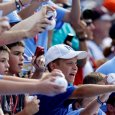
2009 All-Star David Wright played in the 2004 Futures Game in Houston (Tony Gutierrez/AP)
On the chorus of their song “Pastime,” alt-rock outfit The Baseball Project wonder, “Pastime are you past your prime?” Based on astronomical attendance figures and general popularity, the game is hardly beyond its best days. In fact, many would argue it’s enjoying a golden era.
It’s been a dog’s age, however, since the All-Star Game was at its peak. Once played with passion and pride – The Baseball Project also muse over Pete Rose effectively ending Ray Fosse’s career in a game-ending collision at home plate at the 1970 edition of the game – the Midsummer Classic has long since become a frivolous exhibition. The reasons are as multitudinous as they are wide-ranging, from Interleague Play and free agency watering down the novelty — once one of its charms — to farcical selection methods (Tim Wakefield, anyone?). Despite Major League Baseball’s lukewarm effort to incentivize its All-Star Game with the token gesture of home-field advantage being awarded to the winning league’s representative in the ensuing World Series, the contest remains largely irrelevant to the dyed-in-the-wool fans of the sport.
Of course, the tipping point for this change came at the 2002 All-Star Game in Milwaukee. Torii Hunter and friend Barry Bonds played grab-ass in shallow center field after Hunter robbed Bonds of a homer with a leaping grab at the wall. Even worse, it’s since been implied that then-Phillies righty Vicente Padilla was drunk prior to entering the game or became drunk between innings and therefore could not pitch beyond his two frames (amazingly shutout innings), partly resulting in the game ending in a tie. These are not exactly the hallmarks of professional competition. And while Tuesday’s game was generally well played and mildly interesting, its turning point came on the misadventure of out-of-position National League left fielder Justin Upton, normally a right fielder for the D-backs.
Incredibly, however, a new phenomenon has risen from the All-Star Game’s post-apocalyptic landscape, at least for the diehards: The Futures Game. This matchup pits the highest-touted of each team’s farm, dividing them into World and U.S. rosters. Scouts flock to the gathering of baseball’s up-and-comers, which enjoyed its 11th installment on Sunday to kick off All-Star festivities in St. Louis.
The Internet, for better or worse, has provided boundless in-depth coverage to seemingly insatiable audiences of all pursuits. Baseball is no exception. Fans are looking more closely at who’s developing down on the farm, with a wide array of telling statistics and scouting reports at their fingertips, and bloggers and alternative media are meeting the needs of voracious readers. Phil Hughes, all of 23 years old now, was a household name at least a couple years before his debut. Preseason top-10 lists for each teams’ prospects are among the biggest draws at sites like Baseball Prospectus. The annual First-Year Player Draft, once merely a footnote for baseball in comparison to its counterparts in the NFL, NBA and NHL, increases in popularity each year and is now aired on the MLB Network.
All of this considered, it’s not surprising the Futures Game has taken off. It allows us to put faces (donning double-ear-flap helmets, per Minor League rules, of course) to otherwise mythical and remote names, store away fantasy’s hottest pickups for the coming weeks, months and years, and perhaps most importantly, forget Chris Berman’s obnoxious Home Run Derby calls (painfully drawn out over a snoozy two hours this year) and that Jason Marquis was named to the NL All-Star team in the first place. Of course, being the savvy, self-promoting entity that it is, MLB chooses to bury the lone event of substance during the annual sports calendar’s deadest three-day period on Sunday, when the big clubs are finishing off the first half. After all, we wouldn’t want to infringe on the Taco Bell Celebrity Softball Game in which Olympian Shawn Johnson flipped her way to first base, would we?
Of note for the locals at this year’s Futures Game were Mets farmhands Wilmer Flores and Jenrry Mejia, and Yankees prospects Jesus Montero and Manny Banuelos, all of whom played for the World team, which was victorious, 7-5. These kids and — to the credit of St. Louis’ fans — 36, 311 spectators waited out a four-plus-hour rain delay to play a tightly contested, weather-truncated seven-inning game. Trailing by two runs in the final frame, the World squad mounted a four-run rally to pull out the win.
Follow Dan Mennella on Twitter @DanMenella




